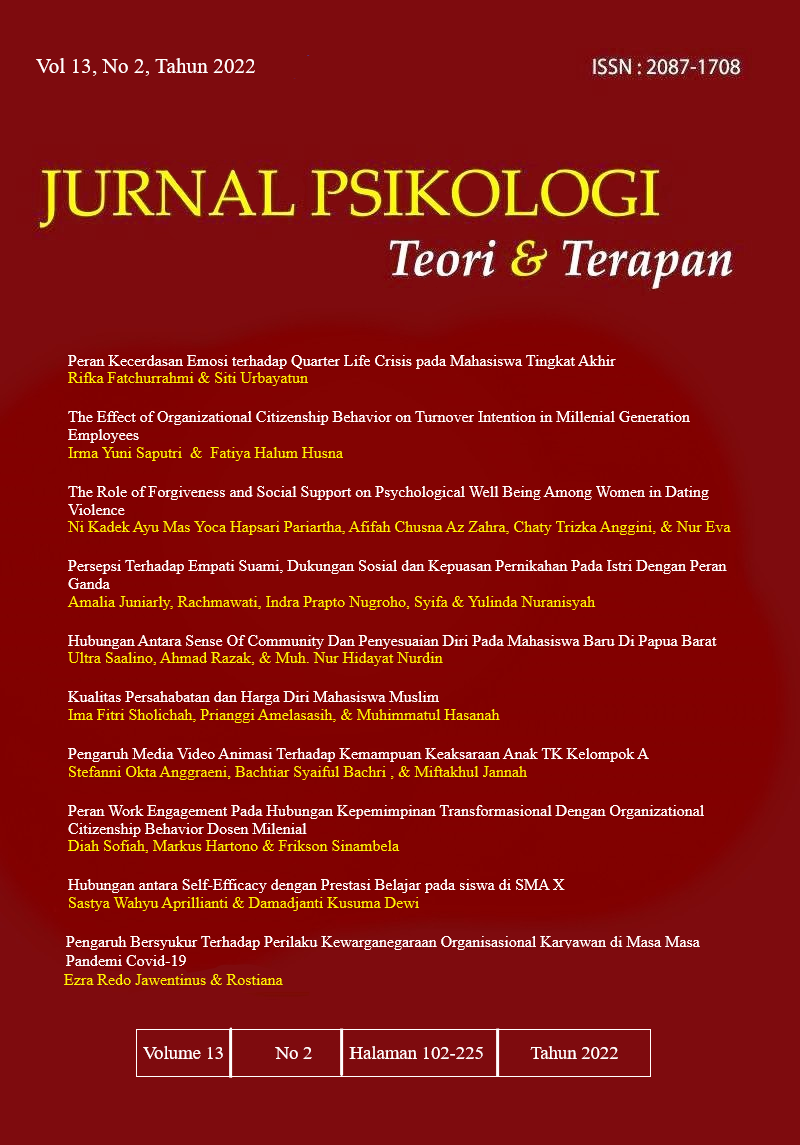Kualitas Persahabatan dan Harga Diri Mahasiswa Muslim
DOI:
https://doi.org/10.26740/jptt.v13n2.p164-170Keywords:
Friendship quality, self-esteem, muslim students, Kualitas persahabatan, harga diri, mahasiswa muslimAbstract
Abstract: Self-esteem is a basic human need for normal and healthy development in the process of life. One of the factors forming self-esteem is the friendship quality. Friends are cognitive and affective resources that can strengthen individual self-esteem. This study aims to empirically examine the role of friendship quality on self-esteem. The research participants were 100 Muslim students. The measuring instrument used is Friendship Quality Scale and Self-Esteem Scale. This study employs quantitative approach with linear regression analysis techniques. The results shows that the friendship quality plays a role in affecting the level of self-esteem at Muslim students (F = 5.093, R = 0.22, p <0.05). That means that the higher of friendship quality, the higher the level of self-esteem at Muslim students.
Abstrak: Harga diri merupakan kebutuhan dasar manusia untuk berkembang normal dan sehat dalam proses kehidupan. Salah satu faktor pembentuk harga diri yaitu kualitas persahabatan. Teman merupakan sumber daya kognitif dan afektif yang dapat memperkuat harga diri individu. Penelitian ini bertujuan untuk menguji secara empiris peranan kualitas persahabatan terhadap harga diri. Subjek penelitian ini adalah 100 mahasiswa muslim. Alat ukur yang digunakan adalah Skala Kualitas Persahabatan dan Skala Harga Diri. Penelitian ini menggunakan pendekatan kuantitatif dengan teknik analisis regresi linier. Hasil penelitian menunjukkan bahwa kualitas persahabatan berperan dalam mempengaruhi tinggi rendahnya harga diri pada mahasiswa muslim (F= 5.093, R= 0.22, p<0.05). Semakin tinggi kualitas persahabat maka semakin tinggi pula harga diri pada mahasiswa muslim.
References
Aiken, L.R. (2002). Human development in adulthood. New York; Boston; Dordrecth; London; Moscow; Kluwer Academic Publisher.
Dariyo, A. (2018). Hubungan Antara Persahabatan dan Kecerdasan Emosi dengan Kepuasan Hidup Remaja. Journal Psikogenesis, 5(2), 168. https://doi.org/10.24854/jps.v5i2.505
Jalaluddin. (2010). Psikologi Agama. Jakarta: PT Raja Grafindo Persada.
Lana, M. C. D., & Indrawati, K. R. (2021). Peranan kualitas persahabatan dan kecerdasan emosional pada kebahagiaan remaja. Jurnal Psikologi Udayana , 8(1), 5607. https://doi.org/10.24843/JPU.2021.v08.i01.p010.
Lutan, R. (2003). Self Esteem Yang Sehat: Teknik Pengembangan. Bagian Proyek Peningkatan Mutu Organisasi dan Tenaga Keolahragaan Dirjen Olahraga Depdiknas.
Mendelson, M. J., & Aboud, F. (2012). Measuring Friendship Quality in Late Adolescents and Young Adults: McGill Friendship Questionnaires. Canadian Journal of Behavioral Science 31(2), 130-132. doi: 10.1037/h0087080.
Raboteg-Saric, Z., & Sakic, M. (2013). Relations of parenting styles and friendship quality to self-esteem, life satisfaction and happiness in adolescents. Applied Research In Quality Of Life, 9(3), 749-765. doi: 10.1007/s11482-013-9268-0Robins, R. and Trzesniewski, K. (2005). Self-esteem development across the lifespan. Current Directions In Psychological Science, 14(3), pp.158-162.
Santrock, W. J. (2012). Life-Span Development Jilid 1. Penerbit Erlangga.
Wandono, W. A. (2017). Upaya peningkatan harga diri rendah pada pasien depresi. Jurnal psikologi, 4, 2.
Downloads
Published
How to Cite
Issue
Section
License

This work is licensed under a Creative Commons Attribution-NonCommercial 4.0 International License.
Authors who publish in this journal agree to the following terms:
Copyright in any article is held by the author.
The author grants the journal, publication rights with the work simultaneously licensed under a Creative Commons Attribution License that allows others to share the work with an acknowledgment of the work's authorship and initial publication in this journal.
Authors may enter into separate, additional contractual arrangements for the non-exclusive distribution of the journal's published version of the work (e.g., posting it to an institutional repository or publishing it in a book), with an acknowledgment of its initial publication in this journal.
Authors are permitted and encouraged to post their work online (e.g., in an institutional repository or on their website) prior to and during the submission process, as this can lead to productive exchanges, as well as earlier and greater citation of published work.
 Abstract views: 1974
,
Abstract views: 1974
, PDF Downloads: 2081
PDF Downloads: 2081


















